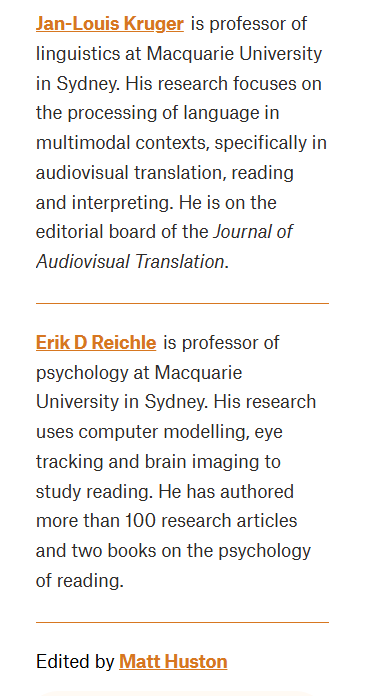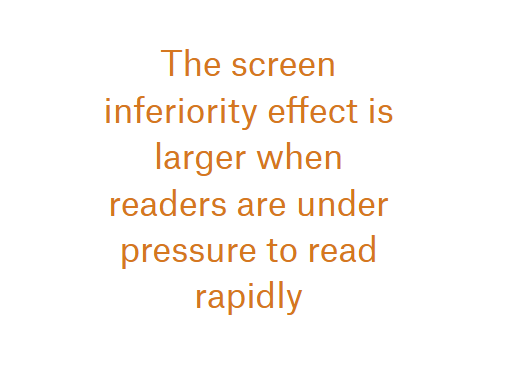Welcome to DU!
The truly grassroots left-of-center political community where regular people, not algorithms, drive the discussions and set the standards.
Join the community:
Create a free account
Support DU (and get rid of ads!):
Become a Star Member
Latest Breaking News
Editorials & Other Articles
General Discussion
The DU Lounge
All Forums
Issue Forums
Culture Forums
Alliance Forums
Region Forums
Support Forums
Help & Search
What does switching from paper to screens mean for how we read?

It’s well established that we absorb less well when reading on screen. But why? And can we do something to improve it?
https://psyche.co/ideas/what-does-switching-from-paper-to-screens-mean-for-how-we-read

Reading is so commonplace that it’s hard to appreciate how much of a challenge it poses to the human brain. As you read this sentence, you’re using the visual forms of words to access their meanings and pronunciations from memory, and then using this information, and the neural systems that evolved for spoken language, to construct larger units of meaning: phrases, sentences and extended discourse. Reading is a relatively recent cultural invention; our brain did not evolve to read. Only after years of education and practice do people learn to coordinate the brain systems needed to support skilled reading. This process is inherently difficult, as evidenced by the fact that a significant proportion of people struggle to attain reading proficiency despite having normal intelligence and opportunities for education.
Now pause and think about how you’re reading this article. You are almost certainly using a digital device such as a computer, smartphone, tablet or e-reader. This simple fact is worth contemplating because it’s only in the past decade that the technology required for digital reading has become ubiquitous. This shift from reading more traditional books, magazines and newspapers to digital media has brought at least one obvious change: it has placed the wealth of information collected by our species at our immediate disposal. This has affected how people use information, with one example being that readers of digital content must exercise critical thinking to sift through the volumes of information at their fingertips.
Given these changes, one might ask if, and how, the use of digital devices has altered the nature or quality of reading. Perhaps you have noticed, for example, that it seems to be more difficult for you to concentrate when you are reading something online than when you are reading a hard-copy book. Does it actually make a difference whether you’re reading a piece of writing on a laptop or on a piece of paper? We recently conducted a review of the scientific research that bears on this subject and, based on these findings, we can offer some likely answers.
Let’s begin by considering the scripts that are used to read and write. These systems differ across cultures, as a comparison of written English and Chinese makes clear. However, despite often large differences between scripts, the mental processes that support reading appear to be remarkably similar. Perhaps the best evidence for this comes from brain-imaging experiments showing convergence in the cortical regions that support the reading of languages such as English and Chinese. This research shows that the same regions are involved in visually processing printed words and then using the meanings of those words to construct the meanings of phrases and sentences.
snip


3 replies
 = new reply since forum marked as read
Highlight:
NoneDon't highlight anything
5 newestHighlight 5 most recent replies
= new reply since forum marked as read
Highlight:
NoneDon't highlight anything
5 newestHighlight 5 most recent replies
What does switching from paper to screens mean for how we read? (Original Post)
Celerity
Mar 2025
OP
LoisB
(12,779 posts)1. Interesting.
Beartracks
(14,528 posts)2. TLDR;....
Ha! Just kidding. ![]() This is, indeed, fascinating reading.
This is, indeed, fascinating reading.
==============
Intractable
(1,928 posts)3. Article does not distinguish between small screens and large screens ...
... nor dark text on light background vs. light text on dark background.
As an avid reader and writer, my experience says these things make a big difference.
I use a big screen (43"![]() and light text on dark background. Over time, my ability to read and comprehend from the screen has exceeded that of using paper.
and light text on dark background. Over time, my ability to read and comprehend from the screen has exceeded that of using paper.
If one wants to appreciate DU and other websites to the fullest, one needs a big screen.
